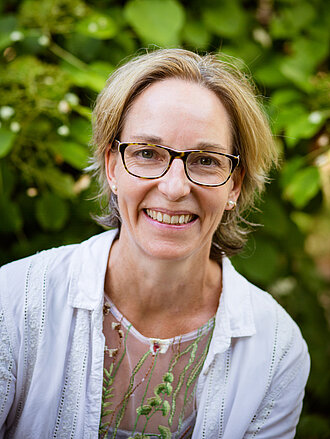Prof. Sabine Schmidt-Lauff

What excites you about adult learning and education?
"The diversity, heterogeneity, inconsistency and ever-changing tasks that practice, science and politics - with the goal of 'education for all adults' - meet accordingly, are a great challenge and at the same time the fascinating thing about adult education for me. It is about cultivating human learning over the longest phase of life (50 and more years of adulthood). As a universal human right, this is a call to ensure that spaces and times are created, defended and preserved in which adults have the opportunity to pursue their learning and educational interests, and indeed to develop them in the first place."
Why did you choose to do research in the field of adult learning and education?
"For me, 'adult education' also includes a variety of quite controversial approaches about the role of (lifelong and lifewide) learning in this rapidly changing world, which is fundamentally critical of modern, optimizing interpretations of a functional self-regulated learning. The (German) concept of BILDUNG is part of a democratic tradition, too, which - we see this more than ever at present - is characterized by very fragile relationships between subject and society, individual and world, self and structure, politics and opinion. If I were to name my 'favorite', very own research focus, it is time and the meaning of temporal phenomena in the context of adult learning. TIME FOR LEARNING! In the preoccupation with the (professional) cultivation of learning, time plays such a significant and fundamental role that it is, in my view, incomprehensible how it can be repeatedly overlooked. The research of time-related educational science is so helpfull to connect across disciplines as well as across national borders. It opens doors into the future ... worldwide!"
Sabine Schmidt-Lauff holds the Professorship for Continuing Education and Lifelong Learning at Helmut-Schmidt University of Hamburg since September 2016. Since 2020, she is a member of the Senate Committee for International Affairs (Senatsausschuss für Internationales) of the HSU. She is a member of the German Society for Educational Sciences (Deutsche Gesellschaft für Erziehungswissenschaften DGfE), Adult Education Section and was Chairperson of the Board from 2010 to 2014. She was Guestlecturer and Sub-Coordinator of the Autumn School (University of Delhi; IGNOU (Delhi); IIALE (Delhi), University of Würzburg) in the framework programme Indian and European Insights of the German Academic Exchange Service (DAAD). She has also been involved in the previous ERASMUS+ COMPALL (Comparative Studies in Adult Education and Lifelong Learning; 2015 - 2018) and INTALL (International and Comparative Studies for Students and Practitioners in Adult Education and Lifelong Learning; 2018 - 2021) Strategic Partnerships. She is a reviewer for the DFG (German Research Foundation) and the Alexander von Humboldt Foundation.
- professionalisation and professionalism in adult education
- professional identity
- and international-comparative research on lifelong learning
- Professional acting in adult and continuing education
- research and numerous national as well as international publications on temporal and time-related challenges for learning throughout the whole lifespan in a globalised and virtualised modern world
CG7: Digitalisation in Adult Education and Learning
Co-Moderators: Prof. Emmanuel Jean Francois, Dr. Lisa Breitschwerdt
The digital transformation that stemmed from dynamics in technological progress, which enables the emergence of new types of educational practices, creates demands for new educational offerings/programmes/strategies, and changes education (including teaching and learning ) in all areas. This also results in changing demands in adult competencies for a critical mindset / reflection / on the diverse consequences (i.e., from individual and social to planetary) that are indispensable. Organizations, educational institutions, and professional actors have used various digital technologies to facilitate adult education and learning in order to provide a better learning experience to adult learners. Such phenomenon is called digitalization of adult education and learning. Although such digitalization started decades ago, the lockdown caused by the global pandemic corona virus (COVID-19) and now Artificial Intelligence (AI) with its generative tools have produced an increasing digital acceleration at every systemic level (mega, macro, meso, and micro). Accordingly, the module will inquire and analyze how digitalization is changing adult education in different ways through:
- changing political (including infrastructural, strategic) conditions,
- digitalization-induced (professional) activities/competencies, approaches, and programmes, and
- new opportunities/challenges of (AI) learning tools.
The digitalization of adult education and learning affects, if not all, most countries in the world. However, the policies, guidelines, approaches, and practices of digitalization may vary based on socio-cultural, socio-economic, and/or socio-political contexts of nations and regions of the world. This module intends to enable participants to critically analyze the digitalization and implementation of digitalization policies in adult education and learning in national/cultural and cross-national/cross-cultural contexts.
- ALVES, N./ SCHMIDT-LAUFF, S./ DOUTOR, C./ CAMPOS, L. (2020): Contexts of Recognition of Prior Learning. A comparative study of RPL initiatives in Brazil, Portugal, and Germany. In. Despotovic, M. & Popovic, K. (eds.). Andragoske studije/Andrago ical Studies, (2)2021 – Articles. Open Access: [15.06.2021] file:///C:/Users/schmidts/AppData/Local/Temp/AS_2020-2_04.pdf
- BENZ-GYDAT, M./PABST, A./PETERSEN, K./SCHMIDT, K./SCHMIDT-LAUFF, S./SCHREIBER-BARSCH, S. (2021): Erwachsenenbildung als kritische Utopie? Diskussionen um Mündigkeit, Gerechtigkeit und Verantwortung. Frankfurt/M.: Wochenschau Verlag. https://www.hsu-hh.de/wb/wp-content/uploads/sites/647/2021/01/Erwachsenenbildung_als_kritische_Utopie-.pdf
- SCHMIDT-LAUFF, S. (2023). Learning and Teaching in Higher Education in Post-Covid Times: A Digital Transformation. In. Vanna Boffo & Regina Egetenmeyer (eds.). Re-thinking Adult Education Research. Beyond the Pandemic, pp. 251-163. Firenze University Press (Italy), https://doi.org/10.36253/979-12-215-0151-3.23
- SCHMIDT-LAUFF, S. (2023). Time and Temporalities in (Adult) Education and Learning. Sisyphus Journal on Education, Vol. 11 No. 1, S. 6-9. https://doi.org/10.25749/sis.29952
- SCHMIDT-LAUFF, S. (2019): Learning towards the future – Rethinking temporal contingencies. In: Indian Journal of Adult Education, Vol. 80(3-4), p. 5-15. ISSN 0019-5006. Delhi (India)
-
SCHMIDT-LAUFF, S./ BREITSCHWERDT, L./ SCHWARZ, J. (2023). Global Challenges need Global Perspectives - Comparative Research on Adult Education. In Lisa Breitschwerdt, Jörg Schwarz & Sabine Schmidt-Lauff (Hg.) (2023). Comparative Research in Adult Education: Global Perspectives on Participation, Sustainability and Digitalisation, pp. 11-28. Bielefeld: wbv Publikation. https://dx.doi.org/10.3278/9783763971336


